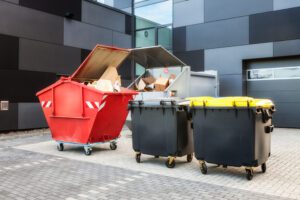How Startups Can Save Money Through Efficient Waste Practices

In the dynamic world of startups, every penny counts. From streamlining operations to maximising value at every stage, smart financial decisions can make the difference between thriving and merely surviving.
One often-overlooked area that offers tangible savings? Waste management. Implementing efficient waste practices isn’t just good for the planet — it’s good for business, too.
Whether you’re running a small tech venture from a co-working space or launching a new food delivery concept, understanding how to reduce, manage, and dispose of waste can lead to significant cost benefits. Here’s how savvy startups are turning rubbish into resourcefulness.
Why Waste Matters — Especially for Startups
For many startups, waste management is a back-burner issue, handled reactively rather than strategically. Yet waste, in all its forms — from packaging and materials to digital clutter and energy inefficiencies — can be a major drain on resources. Left unchecked, it not only inflates operating costs but also affects environmental credibility and compliance with regulations.
Startups often operate on tight margins. Over-ordering supplies, using inefficient packaging, or failing to optimise disposal methods can quietly erode profits. By contrast, adopting lean, environmentally conscious waste practices demonstrates foresight, operational control, and brand responsibility — attributes increasingly valued by customers, investors, and partners.
One immediate win is re-evaluating your approach to commercial waste collection. Engaging with providers that offer tailored, cost-effective plans based on your specific output can save money and reduce environmental impact.
Practical Waste-Saving Strategies for Startups
Here are several efficient waste practices that startup founders and office managers can begin implementing today:
1. Conduct a Waste Audit
Start with a clear picture. Track what types of waste your business produces — from cardboard and food scraps to e-waste and ink cartridges. Understanding volume, sources, and disposal methods will help you target the most cost-intensive areas first.
2. Reduce and Rethink Procurement
Buying in bulk may seem economical, but not if half of it goes unused or expires. Focus on what you truly need and favour suppliers who offer minimal or recyclable packaging. Digital tools can also help reduce paper use and simplify inventory management.
3. Embrace Reuse and Upcycling
Invest in reusable office supplies, or better yet, go digital. Encourage team members to use refillable items and donate or repurpose equipment and materials where possible. Startup culture thrives on innovation — so channel that creativity into sustainability.
4. Recycle Smartly
It’s not just about separating paper from plastics — it’s about ensuring items are clean, properly sorted, and suitable for recycling facilities. Partner with a reliable commercial waste collection service that offers clear guidelines and ensures compliance with local recycling standards.
5. Digital Decluttering
Data storage consumes energy. Regularly archive or delete old files, unsubscribe from unnecessary emails, and use cloud platforms with green credentials. This not only cuts energy usage but also boosts productivity and cybersecurity.
Long-Term Value and Competitive Advantage
Embracing efficient waste practices isn’t just a short-term money-saver — it’s an investment in your startup’s future. Here’s how it adds long-term value:
Brand Differentiation
Consumers and B2B partners increasingly favour businesses that act sustainably. Clear environmental practices, especially around waste, can set your startup apart in a crowded market.
Regulatory Readiness
Environmental legislation is tightening. From packaging laws to emissions targets, startups that adopt forward-thinking waste strategies will stay ahead of compliance — avoiding fines, delays, and last-minute overhauls.
Boosting Employee Engagement
Sustainability fosters a sense of purpose. Employees who feel their workplace values the planet often show higher engagement and loyalty. In small teams, that cultural boost can make a significant difference.
Operational Clarity
A well-organised approach to waste often reflects — and contributes to — wider operational efficiency. Less clutter means more focus. Fewer unnecessary purchases mean better budgeting. And strong waste systems promote thoughtful, scalable processes.
To achieve all of this, startups should not overlook the value of professional commercial waste collection. Not only does it simplify compliance, but it also enables better tracking of your environmental footprint and often includes services like recycling, hazardous waste handling, and sustainability reporting.
For modern startups, efficiency and environmental responsibility go hand in hand. Implementing smart waste strategies isn’t just about tidying up — it’s about tightening the belt, strengthening your brand, and futureproofing your business.
With the right approach to procurement, recycling, and commercial waste collection, young businesses can make big strides toward sustainability without compromising on growth. In fact, they might just find that smart waste habits become part of the recipe for lasting success.
Read more:
How Startups Can Save Money Through Efficient Waste Practices
